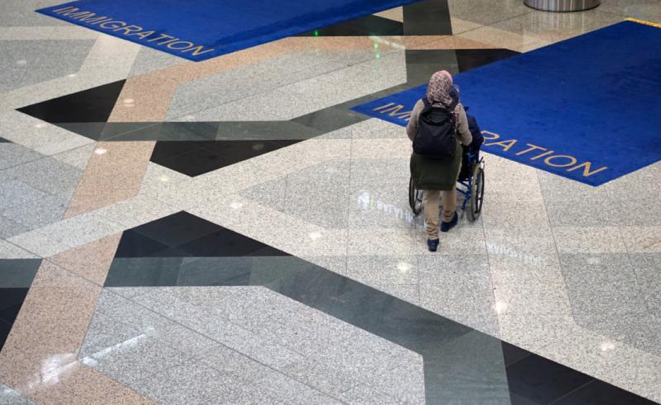NEW RESOURCES AVAILABLE: Know Your Rights from Protecting Immigrant Families
The Arc denounces the harmful rule that was finalized by the U.S. Department of Homeland Security (DHS) on Wednesday, August 14. This new rule discriminates against people with intellectual and developmental disabilities (I/DD) and their families, among others. It allows the federal government to deny admission into the U.S. and unfairly restructures immigration in a way that is detrimental to individuals based on their disability and the use of vital programs like Medicaid.
The DHS final rule means the government will consider a significantly expanded list of factors to determine whether a person will be considered a “public charge.” A public charge is a person that the government thinks will (currently or in the future) be dependent on the government for support. The rule will hurt children and adults based on disabilities and chronic conditions. The use of many programs such as most Medicaid services (including regional center services and Media-Cal), the Supplemental Nutrition Assistance Program (SNAP or also referred to as CalFresh), housing assistance, and other important benefits will also be considered in the public charge test. DHS acknowledges that the new rule may have an outsized impact on people with disabilities.
“This new policy is devastating to many people with intellectual and developmental disabilities and their families. It discourages immigrant families from utilizing critical public services out of fear of harming their immigration status. The rule will increase poverty, hurt public health, and worsen housing instability. It’s the latest callous tactic in restricting access to necessary services and supports. The Arc continues our work to ensure that non-citizens with any type of disability have a fair opportunity to enter and reside legally in the U.S., without unnecessary or discriminatory restrictions based on their disability,” said Peter Berns, CEO, The Arc.
The Arc opposed the rule and submitted comments with the Consortium for Citizens with Disabilities when the rule was proposed in 2018.
What Do We Do Now?
This rule has already had a chilling effect on Californians with disabilities in need of public services. It is critical that families, advocates, regional centers, service providers, county administrators, and more make specific outreach efforts to individuals and families that are disenrolling from services and supports. Knowledge and information is most important right now. Here are a few facts:
- The public charge regulation does not apply to lawful permanent residents (green card holders) applying for citizenship, refugees, asylees, Special Immigrant Juveniles (SIJs), certain trafficking victims (T nonimmigrants), victims of qualifying criminal activity (U nonimmigrants), or victims of domestic violence (VAWA self-petitioners), among others.
- The rule won’t go into effect until mid-October, and it is only prospective, meaning that any services or supports used before then would not be considered.
- The State of California is filing a lawsuit and will seek a preliminary injunction to stall enforcement of the new rule until the courts rule whether or not it is legal. Many other organizations are also filing lawsuits. You can view the press conference with Governor Newsom and Attorney General Xavier Becerra announcing the lawsuit here.
- Some public services are not included in the rule, including Children’s Health Insurance Program (CHIP) and pregnant mothers.
There are many organizations contracted with the state to provide free legal assistance to immigrant families that are concerned about the new rule. The California Department of Social Services has a list of organizations throughout the state that will answer questions and provide information, education, and/or outreach services specifically related to public charge. Local disability organizations are encouraged to contact one of these organizations in their region to coordinate outreach activities. https://www.cdss.ca.gov/Benefits-Services/More-Services/Immigration-Services/Immigration-Services-Contractors/Public-Charge-Contact-List

